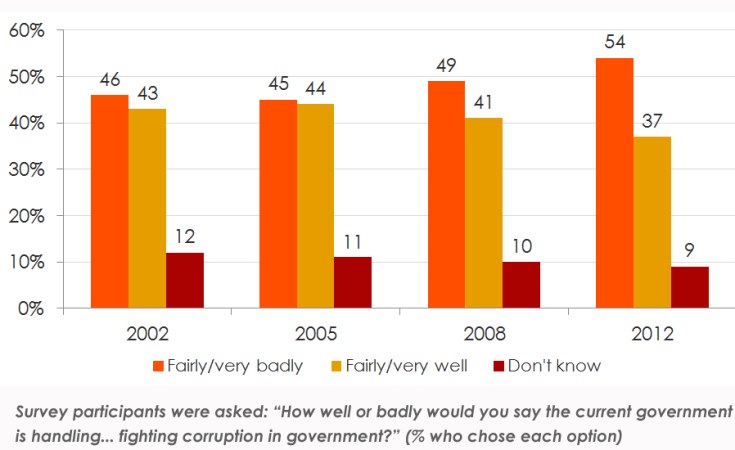An excerpt from the Afrobarometer report, "Governments Falter in Fight to Curb Corruption: The people give most a failing grade", published in November 2013:
A majority of people in 34 African countries condemn their governments' anti- corruption efforts, according to Afrobarometer surveys of more than 51,000 people between October 2011 and June 2013.
Fifty-six percent of people said their governments have done a "fairly" or "very bad" job of fighting corruption; while just 35% say their governments have done this "fairly" or "very well". For the 16 countries surveyed since 2002, negative ratings have increased from 46% to 54% with only five countries showing a decline in these negative ratings over the last decade.
The negative ratings surface despite the fact that eradicating corruption and improving governance in Africa have been priorities for most major international organizations and many political leaders since the mid-1990s.
Across the 34 countries, perceptions of corruption are highest for the police, followed by government officials and tax officials. Officials in the office of the presidency are perceived to be the least corrupt.
The Afrobarometer surveys have also found that almost 1 in 5 people (16%) have paid a bribe one or more times to a government official in the past year in order to get an official document or permit. Paying a bribe to get medical treatment as well as avoid a problem with the police were the other two most cited reasons. Nearly one in three Africans (30%) has paid a bribe at least once in the past year.
Sierra Leone, Morocco, Guinea, Kenya and Egypt have the most people paying a bribe for a service or to avoid a problem. Fewer people in Namibia, Mauritius, Cape Verde and Botswana say they engage in this form of corruption.
Corruption punishes the poor the most. Africans who often go without enough food to eat perceive higher levels of corruption in their state institutions and are more likely to pay a bribe, give a gift or do a favour for a government official in order to obtain official documents, gain access to public services or avoid a problem with the police. Furthermore, the poor are especially likely to be confronted by demands for bribes in countries where experiences with corruption are especially high.
Corruption also appears to be bad for democracy. People who perceive higher levels of corruption within their state institutions, as well as those who have had to engage in petty corruption, are more likely to be "not at all" or "not very" satisfied with the way democracy works in their countries.
Key Findings
- More than 5 in every 10 people (56%) say their governments are doing a poor job of fighting corruption. In the 16 countries surveyed over the past decade, negative ratings have increased by 8 points since 2002.
- Police attract the highest ratings of corruption across the 34 countries, with 43% of people saying that "most" or "all" of them are involved in corruption. Negative perceptions are highest in Nigeria (78%), Kenya (69%) and Sierra Leone (69%).
- Fully one in three respondents (30%) report paying a bribe at least once in the past year either to obtain a service or avoid a problem, ranging from a low of just 4% among Batswana to 63% of Sierra Leoneans. Bribes were most commonly necessary to obtain a document or permit: 16% have paid a bribe in the past year for this purpose.
- The poor pay bribes more often than do better off citizens. Almost one in five people (18%) who had gone without enough food to eat one or more times in the past year had paid a bribe to a government official in the past year to obtain medical treatment, compared with just 12% among those who never went without food. Similarly, the poor were more likely to have paid a bribe for a school placement by 13% to 7%. The poor are especially likely to be targeted by officials in countries where reported levels of corruption are highest.
- Experience of poverty is also linked to higher perceived levels of corruption, especially in the justice sector. Almost half the people (46%) who go without enough food to eat one or more times a year rate "most" or "all" of the police to be corrupt, compared to 39% among those who never go without food. And 31% of the poorest perceive judges and magistrates to be corrupt, compared to 24% among better off citizens.
- Perceptions that officials are corrupt are linked to dissatisfaction with democracy. For example, only 36% of those who perceive high levels of corruption in the office of the presidency are satisfied with democracy.
- Sixty-six percent of those who think that none of the officials in the office of the presidency are corrupt express satisfaction with democracy.


